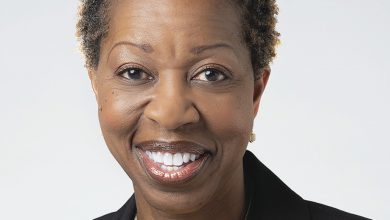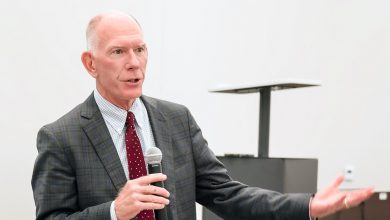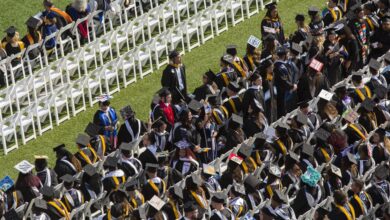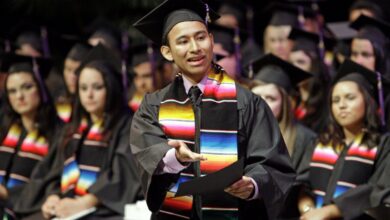How the Largest Higher-Ed Strike in U.S. History Blew Up Finals
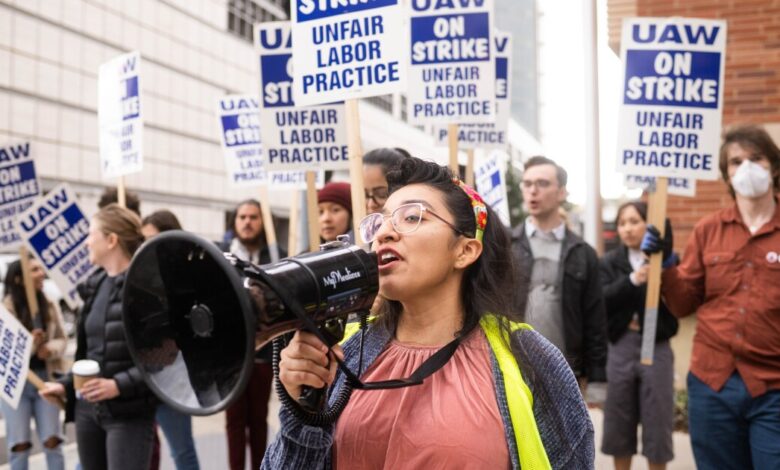
Steps away from the cafe, a group of 50 UCLA workers and faculty members walked in circles and carried picket signs around the university’s iconic inverted stone fountain. Around 1 p.m., they resumed their chants — calls for higher wages and better benefits.
A three-week-long strike by graduate students, postdocs, and researchers has profoundly disrupted life at one of the nation’s most prominent university systems. Now finals are here, and with no teaching assistants on the job, there’s widespread confusion among students and professors on how to proceed.
Students and professors say the campus feels emptier than usual. Since Thanksgiving, some have left entirely and not returned, due to modified and canceled classes and exams. Those who have stayed stuck around for a reason: Their classes are forging ahead.
With the end of the term approaching, faculty members say they’re struggling to fulfill obligations to their undergraduate students. Undergraduate students are concerned with how the strike will impact their grades — and wondering whether they’ll even get grades in the end. All are worried about how long the strike will last.
The UC system reached a tentative agreement with postdocs and academic researchers this week, agreeing to wage increases that the union says reflect the cost of living in one of the most expensive states in the country. But graduate students are still negotiating, and postdocs and researchers are continuing to strike with them.
The university has repeatedly emphasized that it expects faculty members to meet teaching and research responsibilities and ensure the continuity of instruction for students. A Wednesday letter from the UC system’s provost suggested alternate ways that faculty can show support for the strike. Colleges often respond to striking instructors by criticizing how work stoppages harm undergraduates’ learning.
People across the UC system have different perspectives on the strike and whom to blame for the ensuing chaos. But just about everyone feels conflicted in one way or another.
Peyton Quijano, a third-year biology major at UC-Santa Cruz, says she’s caught between wanting to support her TAs and being frustrated by yet another disruption to her studies. She says she understands why the strike has to happen. She’s also paying for her education and wants to get the most out of it.
“I just didn’t think the strike was going to go on this long,” Quijano said.
Grading has been backed up, particularly for large lecture classes. Some students have had finals canceled or made optional. Other courses are operating as usual — save for the echoes of strike chants seeping into classrooms.
A spokesperson for UCLA didn’t respond to a question about how many classes had been canceled or affected by the strike.
Students who have returned to campus are there because their instruction is continuing — either modified or business as usual. By midafternoon on Thursday, nearly every desk was full inside UCLA’s main library.
Dylan Winward, a first-year student at UCLA, said one of his finals was made optional only five days before his exam was set to take place.
Over the last three weeks, Winward and his friends had been completing lectures and assignments from The Hill, a student hub for dorms, dining, and student services on UCLA’s campus. Winward and many of his friends said on Thursday that they were returning to the main campus for the first time since the strike began.
Although students said they sympathize with the TAs and others who are on strike, some are also concerned about grades. “I’ll be really upset if I put in all this work for finals and get nothing back,” said first-year student Sydney Roberts.
It feels a lot like when we were taking classes during the pandemic.
Jacob Castaneda, a third-year political science student who transferred to UCLA this semester, said his course load hasn’t been impacted. His final exams and essays are proceeding as usual. For his three lecture classes, each of which typically have TA-led discussions, his professors have committed to getting grades in on time.
For Mauve Spillard, a fourth-year comparative literature student, one of her professors who usually works with a TA has said grades will be turned in late.
Trent Brown, a first-year American literature undergraduate student, hasn’t had any classes or finals canceled since the strike began. But Brown is worried that delayed grading could affect students trying to apply for honors or other programs.
At UC-Santa Cruz, Quijano said her classes were canceled or moved online during the first two weeks of the strike; by late last week, some were back to in-person. She said her professors respect the cause of the striking workers, but they said they need to continue lessons for students to be able to complete the course.
But Quijano is struggling to get answers to her questions about the material without the help of TAs, and her labs have been canceled. Instead of conducting her own experiments, she has to write a paper based on a photo of the results she would have gotten.
“It feels a lot like when we were taking classes during the pandemic,” she said.
Anna J. Markowitz, an assistant professor of education at UCLA, spent the weekend before the strike recording videos of lectures for her undergraduate Introduction to Quantitative Methods class. The next day, she stopped teaching.
Markowitz’s classes enroll 40 students, and she works with two graduate students. One of them runs the coding lab portion of Markowitz’s undergraduate course and grades all student assignments — work that has now been left ungraded. Markowitz said she will not submit grades or hold a formal final during the strike. For students who want to test their knowledge, she will release an optional exam, but it will not be graded.
I couldn’t look my students in the face and not fully support their right to strike.
As a graduate student at Georgetown University more than a decade ago, Markowitz said she earned the same wage as her graduate students make now: $25,000 for a three-quarter academic year. They are paid for part-time work capped at 20 hours a week, she said, but many graduate students work more.
“Knowing what my students make and knowing how bad I’ve been feeling about that for a long time, I couldn’t look my students in the face and not fully support their right to strike,” Markowitz said of her decision to not cross the picket line.
Markowitz is among 1,000 faculty who have pledged not to teach or submit grades until the strike ends. For some professors, it’s an act of solidarity. Others say that without the help of teaching assistants, it would be impossible to complete grading for classes with hundreds of students — no matter their personal positions on the strike.
David Shorter, a professor of world arts and cultures at UCLA, stopped teaching in solidarity with the graduate-student employees. He’s still holding listening sessions for his students, many of whom aren’t receiving clear directives from their professors or the university about how to exist amid the strike, he said.
Shorter is teaching three classes this quarter and doesn’t know how he’ll grade 300 papers before the end of the term, even if the deadline to submit grades is extended to January. He’d usually have the help of six TAs.
He stopped teaching his classes, one of which is an 80-person lecture, when the strike began. Nearly 25 percent of his students haven’t even returned to campus since Thanksgiving. And a lot of courses for the next term, he said, don’t even have TAs assigned yet.
While Shorter’s classrooms sat empty, a 300-person life sciences lecture at UCLA was nearly full on Thursday. Students were wrapped up in last-day-of-class chatter as the professor continued to make announcements about review sessions, about practice-exam questions, about their final — yes, there would be a final.
The professor went around the room as students were tasked with answering a practice question. Murmuring picked up among the students. They graphed their guesses and checked their responses with one another. The strike hadn’t changed much for these students, beyond canceling their TA-led discussion sections.
The Academic Senate at UCLA has released guidance suggesting that professors could shorten final exams or make them multiple choice, to ease the grading burden.
There have been a handful of incidents where strikers have interrupted midterm exams, said Winward, the first-year student; he reported on them for the campus newspaper, the Daily Bruin. He said some students are concerned about such disruptions happening again during finals week.
The university has proposed paying TAs between $25,000 and $31,000 per year, and graduate-student researchers between $28,000 and $47,000 per year, for part-time work — which officials say would make UC graduate students the highest compensated among public institutions in the Association of American Universities. The union has called for a minimum salary of $54,000.
Another sticking point is housing costs. University officials have stressed that UC-owned housing for graduate students is already 20 to 25 percent below market rates. Tying raises to housing costs, as the union has called for, could cost hundreds of millions of dollars annually, according to the university.
We’re eager to get back to work. We just want to make sure we are living and working in dignified conditions.
UC officials said they had reached agreements with other employee unions in the past year, demonstrating their “flexibility and a genuine willingness to compromise.” The university has proposed working with a private mediator to resolve differences, which the union doesn’t support.
Meanwhile, on most campuses, the deadline to submit final grades this fall has been extended — but only by a few days. And there’s little consistency across campuses.
Faculty members are also struggling to figure out what legal rights they have to participate in a sympathy strike.
A Wednesday letter from Michael T. Brown, the UC-system provost, stated that if faculty members choose not to hold classes or submit grades during the strike, the “university in turn may withhold their compensation.” If faculty members participate in a “partial strike,” where they don’t submit grades but continue to do research, they could also risk disciplinary action.
The letter said that faculty have the responsibility to maintain course and curricular requirements, including “the timely awarding and submission of grades.” The Council of UC Faculty Associations called the letter “misleading.”
For some faculty members, the university is making a frustrating, if not impossible, ask — especially after the pandemic left them feeling burned out and exhausted.
“Most of us are confused, if not stressed, because we just spent three years being very agile for our employers due to COVID,” Shorter said. “And now the expectation is that we would spend our holiday breaks or winter breaks grading hundreds of papers for a situation we did not create.”
The faculty associations’ council also released a Google form for professors to fill out if they expect not to be able to submit final grades without the help of TAs. As of Friday, the group said the total number of expected missing grades was 23,000.
Bernard Remollino, a graduate-student researcher and teaching assistant at UCLA, said what’s happening across UC campuses now sends a critical message: The university works because of its academic student workers. The question of when their work will proceed is up to the UC system, he said.
“We’re eager to get back to work,” Remollino said. “We just want to make sure we are living and working in dignified conditions. And that’s it.”
Source link


